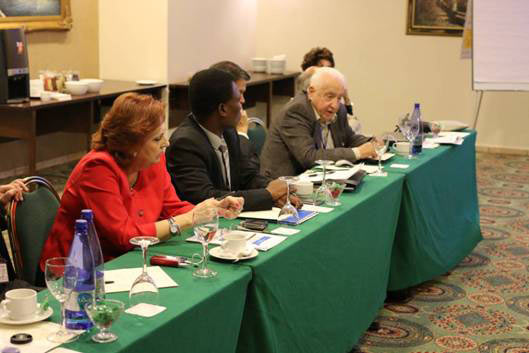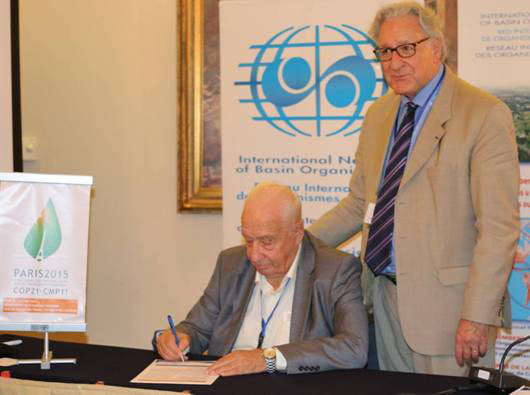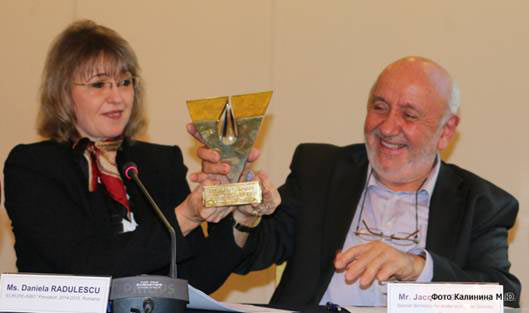THE 13th “EUROPE-INBO 2015” INTERNATIONAL CONFERENCE ON THE WATER FRAMEWORK DIRECTIVE IMPLEMENTATION
Thessaloniki, Greece, 21-24 October, 2015
The Conference was organized jointly by INBO and the Greek Ministry of Reconstruction of Production, Environment and Energy with the support of the French National Agency for Water and Aquatic Environments (ONEMA).
The meeting of the INBO World Liaison Bureau was held before the Conference. The INBO Permanent Technical Secretary J-F Donzier presented annual report about Network activity over the past year since the Conference in Bucharest.This year was marked with INBO preparations to the 7th World Water Forum, where INBO took active part and led some themes, in particular, IWRM, transboundary water resources management, adaptation to climate change and others. The organization also ran the European regional process. At the moment, there are 192 members from 81 countries in INBO. In the current year 28 EU countries and 2 INBO associate members in cooperation with OECD have prepared guidelines on improvement of governance by Water Management Organizations and on adaptation to climate change.
Alongside with other directors of regional networks, Professor Dukhovny presented report on work performed within the framework of NWO EECCA, including participation in organization of several local conferences, 7th World Water Forum, and organization of a special regional conference in Minsk on May 21-22, 2015. He demonstrated efforts made to develop the information network of NWO EECCA, establish knowledge base and glossary on water management and irrigated agriculture and tools for e-learning, etc. At the same time, he mentioned that the Network was working within the limited financing as most financing was only provided by UNECE, Uzbekistan and through small contracts signed with INBO Headquarters. It is necessary to request INBO to enhance interaction with other donors in order to improve financial support to operational activities of NWO EECCA. This is of great importance taking into account increased water scarcity in the region and financial crisis occurring simultaneously in almost all regions. The meeting approved the program of the Ordinary regional conference to be held in Almaty in February, 2016.

The Inaugural of the “EUROPE-INBO” International Conference on the Water Framework Directive Implementation was held at the Mediterranean Palace Hotel on October 22 at 09.00 a.m. Professor Jacques Ganoulis (Special Water Secretary, Ministry of Reconstruction of Production, Environment and Energy of Greece), Afanasiy Papas (Vice President of the Central Macedonia province), Professor Pericles Mitkas (Rector, Aristotle University of Thessaloniki), George Marinakis (President, Greece National Water Users Association), Nicholas Papadanis (President and Executive Director, Water supply company of Thessaloniki), and Directors of Networks for Central Europe, the Mediterranean, Eastern Europe, Caucasus, Central Asia, and European INBO delivered their welcome speeches to the participants of the conference. Pavel Misiga, EU Directorate General of the Environment, welcomed the participants via videoconference. He underlined that as of 2015 – the period of the completion of the Water Directive Implementation- 25 national and 2 regional reports were submitted. Some members – Belgium, Spain, Portugal, France, and Italy – presented reports on condition of all basins as well. In 2009 43% of all European rivers achieved good ecological status, whereas in 2015, 53 % of rivers achieved the same status. WFD is acknowledged by all countries in part of sub-basins, tributaries and aquifers. At the same time, there is a lack of control over water releases for environmental purposes. It is necessary to reconsider the licenses on water intakes, i.e. issue licenses for reduced water intakes WFD instruction on establishment of financial mechanism is not fulfilled, only several basins have managed to develop it. Agriculture is still the main source of diffuse pollution, particularly, this relates to chemical fertilizers. The general strategical assessment will be carried out till 2018, whereas implementation of WFD – till 2022.
Professor Jacques Ganoulis made an interesting report on the work of the newly established Special Water Secretariat under his direction. Its aim is to provide support to implementation of IWRM through specialized governance system. To address current challenges – water disasters, floods, droughts and climate change – the Secretariat is obliged to create a water security system. This system includes development of a mechanism for sustainable functioning of the water sector taking into account financial restrictions, socioeconomic pressure, inflation rate, and economic crisis. Simultaneously, the National Water Committee consisting of Parliament and Government representatives, as well as the National Advisory Water Council consisting of the most recognized and experienced scientists, experts, practitioners, and water users were established. The Special Water Secretariat is responsible for shaping agenda of the National Advisory Council, as well as for preparing documents and issues to be considered by the National Advisory Council. The Secretariat coordinates the work in 14 regions and supervises preparation and implementation of 14 basin development plans. It also prepared water tarification rules for all contracts between water management organizations and the users. The Secretariat is instructed to control updating of the Regional Basin Management Plan every 5 years.
Jerzy Zwozdziak, Water Director, Poland shared his country’s experience on implementation of the 2nd planning cycle of WFD. Ten river basins achieved good water status in the country. Since 2009, the second evaluation of the water status was carried out, whereas changes in the River Basin Management Plan were made in 2015. The training system on the basis of WFD was established in 2014-2015.
Jean-Marie Quemener from the Ministry of Environment of France said that climate change would have serious impacts on France. The modeling reveals that river flow, mostly in the South, will decrease by 20 % by 2070. In dry years water resources will also decrease – as much as by 30%. All these factors demand the Ministry to accept a new concept for addressing these challenges. Information, trainings, dialogues, knowledge generation, water conservation, and environmental restoration are the key adaptation tools.
Professor Maria Lazaridou from Greece reported that good water status will be achieved in the country only in 2027. At the moment, the monitoring network is developed and the adaptation strategy to climate change is worked out.
Mr. Andreas Angelakis from Greece added that the problem of return water and wastewater use is not solved, though these waters are delivered for free. The Ministry of Health objects to the use of these waters because of their quality.
In Romania (Mr. Bogdan Ion and Mrs. Daniela Radulescu) the flood risk maps for most of small basins were generated. The structures that are at highest risks are to be reconstructed immediately.
The water wellbeing in Cyprus depends on local water sources located on the territory of Greece and external water delivery after construction of the aqueduct in the territory of Turkey, says Panaetis Khodjilikous.
The session on water governance in transboundary basins started with the speech of Dr. Dejan Komatina, Secretary of the International Sava River Basin Commission. Established in 2005 the Commission consists of both EU members and non-members – Croatia, Serbia, Montenegro, Czech Republic and Slovenia. The Commission works out and approves the River Basin Management Plan, Sediment Management Plan, Risk Management Plan and Climate Change Adaptation Plan. General activities of the Commission are exchange of information, forecasting, flood warning, and provision of normal conditions for navigation and tourism. In its membership the Commission involves representatives of all water related sectors from neighboring countries.
In the reports on water governance in transboundary basins representatives from other European countries (Austria, Ukraine, Greece, Romania, Macedonia, and Germany) gave information on the results of joint activities in achievement of WFD goals – i.e. good water status and other goals stipulated in the Directive. In particular, Romania, the Ukraine and the Republic of Moldova achieved the planned quality indicators in the Prut and Seret rivers. The joints efforts of these countries regarding provision of information for early flood warning were rather effective and prevented destructive effects on these rivers. To demonstrate the results of joint activities, UNECE and Albanian representative have shared the experience in managing good water quality in Presna Lake, which is situated at the cross of water bodies in Albania, Greece and Macedonia. Here the cooperation is carried out with wider involvement of NGOs. According to Alyona Boyeva from the Ukraine, the country has the obligations on surface water use in front of 5 European countries. It has prepared all guiding materials, taking into account all European Water Directives.
On October 23, the meeting addressed financial and economic aspects of water management. In the report presented by Ioanis Tsiloktis from the Ministry of Reconstruction of Production, Environment and Energy of Greece it was stated that the water sector is financed fully by tax payers and water consumers. Water consumers pay from 0.46 to 4 Euros per m3 depending on total water intake; industry pays 0.5-0.81 Euro per m3. Irrigation water use, in particular, is paid by municipal authorities at the price less than 10 cents per m3, whereas drainage water used for irrigation is for free. The representative from Germany stated that her country failed in financial policy related to water. Having reviewed the current situation, the Ministry of Environment prepared a guide named “Economic instrument for water policy”. This guide will be put into practice the next years.
In conclusion, the Pact on Water and Adaptation to Climate Change has been signed by all regional organizations. The Presidency in EUROPE-INBO has been transferred from Romania to Greece.


|